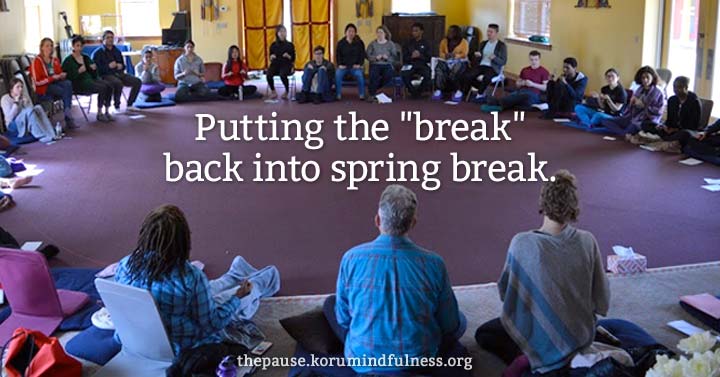
I just got back from a spring break meditation retreat for college and graduate students. It was awesome. I came home from the trip with the biggest smile on my face, feeling in my heart that our world is in good hands ‘cause the young adults out there got this.
On a meditation retreat, you spend your time doing different types of meditation and some movement exercises, like yoga or tai chi. You eat really great food and you spend some time in small groups talking about what you are learning.
You also turn in your phone so you are not tempted to use it, and you spend most of the time in silence, not talking with the other folks around you.

Doesn’t that sound like fun? I mean, who needs Daytona Beach when you can go on a silent, meditation retreat. Party on!
I noticed that some of the students were having second thoughts about choosing a meditation retreat, instead of say, a trip to an island paradise, for their spring break. Especially the first night when we got to the part about giving up their phones.
Too be clear, you are not forced to give up your phone, and a few students chose to keep theirs. But for the most part, the students went along with the suggestion to turn in their phones. Then they sat around with a look of panic in their eyes, their empty hands twitching restlessly, their thumbs with nothing to do.
On the first full day, as we sat in our small groups, talking about what had brought us all to the retreat and just getting to know each other, folks were fairly tentative about the whole experience. I could imagine the thought bubbles above their heads: Why exactly did I think this was a good idea?
As the first day proceeded, occasionally a student would come up to me and whisper, “what are we supposed to be doing right now?” They were uncertain how to manage without something they were expected to do or a device to distract them in the meantime.
What are you supposed to do right now? Nothing. Just be and see what happens.
So, some of them were uncomfortable at first, but as the days wore on, I watched these students transform before my very eyes. In our small group, they began to talk about what they were noticing as they tuned into their inner voices, with curiosity and compassion, instead of being distracted by all the usual outer noise.
They began to say things like:
“I never noticed before that I tell myself stories about how I’m not good enough or can’t do certain things.”
“I am starting to see that I spend so much time worrying about how others perceive me, it’s hard to know what I really want.”
By the end of the retreat, I was hearing,
“I’m having the best day today. I feel really peaceful and free for the first time in a long time.”
“This was the most amazing experience I’ve ever had. I feel like I can live my life differently, enjoying the little pleasures and turning down all the self-criticism.”
On the last day when it was time to get the phones back, Khalila, one of the teachers, led us in a mindful-return-to-your-phone exercise. She invited the students to notice how it felt to turn their phones on, notice their reaction to the content they found there, and then to turn the phone off again.
I was sitting in the front of the room watching the students go through this exercise. It was pretty funny to watch. Some of them opened their phones with great energy and enthusiasm, and then had a hard time putting them back down again one minute later. Others had a look of trepidation or disgust on their faces, turning on their phones as if they were explosive devices that had to be carefully defused, and then quickly putting them back down as soon as they were prompted to do so.
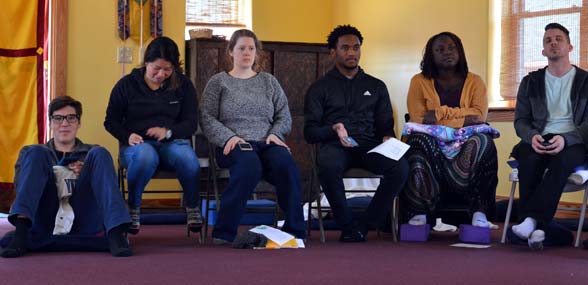
The students were led in a mindful-return-to-your-phone exercise on the last day. 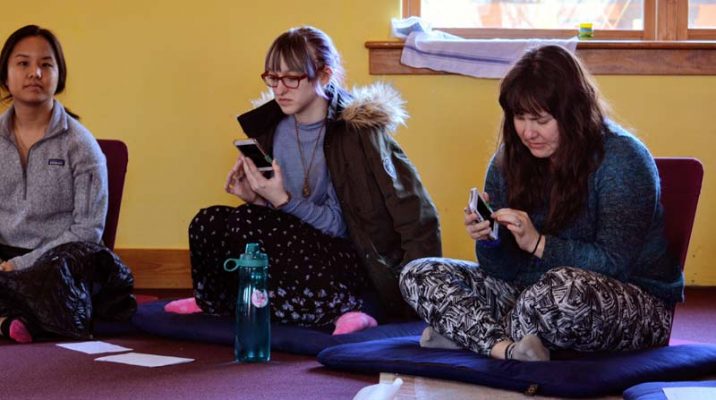
Some students had a look of disgust on their faces, quickly putting their phone back down. 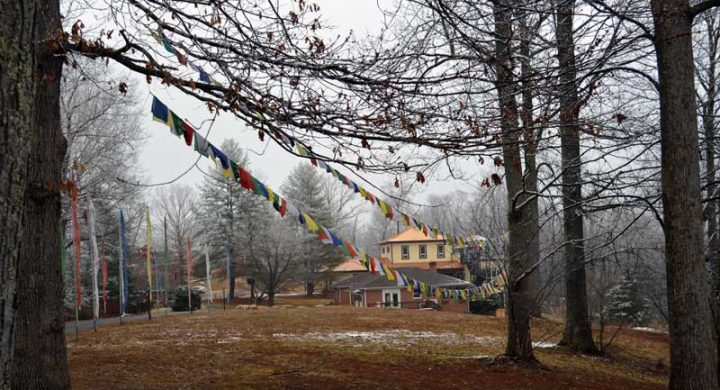
The retreat was at Serenity Ridge in a beautiful spot in nature outside of Charlottesville, VA.
It was so interesting to hear the students say that the aspects of the retreat they were initially most skeptical about—the silence and the ban on using technology—turned out to be the most meaningful. Over the course of the retreat they came to relish the “empty time” they at first feared and dreaded. As they were preparing to leave, most talked about how they could continue to create little bubbles of quiet and reflection in their lives as they returned to their regular routines.
On that last morning as we were taking photos and saying our good-byes, I heard more than one student say, “this was the best spring break I’ve ever had.” Looking around at the compassionate, joyful, centered folks around me, I too thought, “this was the best spring break I’ve ever had.”
Think you’d like to give this whole mindfulness meditation retreat a try? Maybe we’ll see you next year on our Spring Break retreat.
Let us know below if you have questions about how a meditation retreat works or want to share about your own retreat experience .
Photos by me, Holly Rogers!Get our latest articles in your inbox.
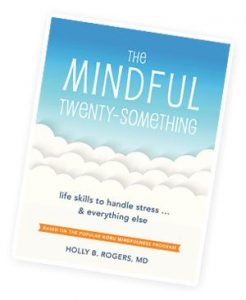
Holly,
This is a wonderful idea. I’ve been thinking about hosting my own retreat for college students with an emphasis on disconnecting with their phones/screens and coming into a deeper sense of knowing their own self.
I’d love to hear about how you planned this and what you plan on doing moving forward with this experience.
For this retreat, the credit for the curriculum and teaching goes to iBme. They are an organization that specializes in leading retreat experiences for teens and young adults. They were fabulous. The curriculum was well thought out and perfect for young adults, and the teaching was excellent. We hope to partner with them to make the spring break retreat an annual event.
Just wanted to say thank you for this article, Holly. I have been considering going on retreat in late April, and reading your post has inspired me to take this idea more seriously.
Hey Jonathan, I’m so glad to hear you are planning to attend a retreat. I think you will find it well worth your time. Let me know how it goes.